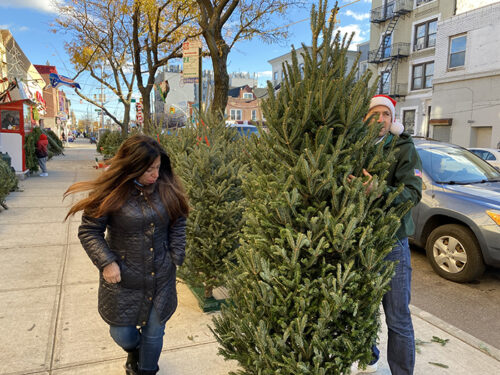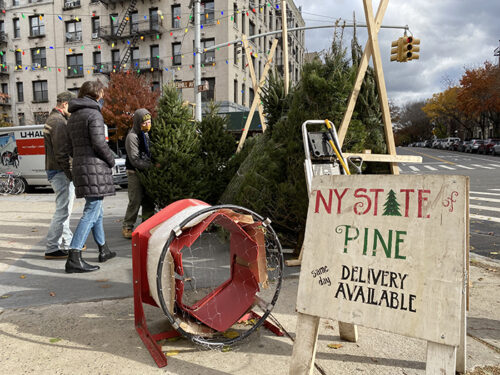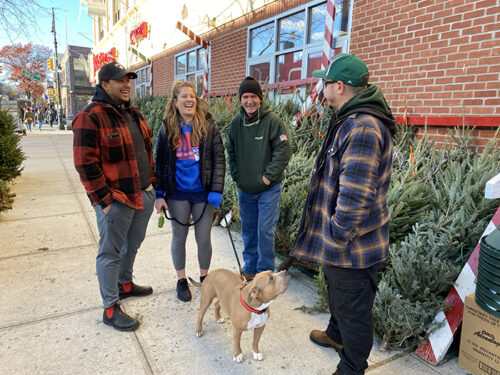
ASTORIA — Two days after Thanksgiving, Maria Rivera was on a mission to find the perfect Christmas tree, and neither frigid temperatures nor across-the-board price hikes on all holiday items would stop her.
So, with her husband Jimmy, she pulled up to Grippo’s Christmas Tree Stand on 31st Avenue near the intersection with Steinway Street in Astoria, Queens. It’s the same spot the seasonal enterprise has held since Frankie Grippo started it in 1985.
“I’ve been in the neighborhood for 55 years, and these guys are the best,” Rivera said. “I always shop around every year to get ideas of what everybody’s doing, and these guys always have the fairest prices.”
But Rivera bristled at having to pay extra this year for her tree.
Michael Grippo, the founder’s nephew, said their trees are about 10% more at wholesale, which accounts for the price increase.
“I’m not too happy with the prices,” Rivera said, “but there’s a shortage of everything these days. So, yeah, we were expecting it to be a little bit pricey.”
“And it’s Christmas,” she said, with her smile returning broadly. “I need my tree.”
Buy Early, Industry Says
Could the phrase “No Tannenbaum” replace the lyric “O Tannenbaum” for some households unable to buy a Christmas tree this year?
While conceding that such a scenario is unlikely, the Christmas tree industry is urging customers to buy early to avoid shortages closer to Christmas.
Wildfires and dry weather in the western U.S. plus supply-chain woes are hinting at limited inventories of both freshly-cut and artificial varieties, according to the American Christmas Tree Association (ACTA). Some farmers in Oregon reportedly lost 90% of their product this summer.
Still, one Brooklyn vendor said there’s no need to let potential marketplace grinches drive one’s purchase.
“The news, I think, might be a bit overblown about the Christmas tree panic,” said Ellis Roberts in a post-Thanksgiving interview. He spoke while serving customers at his spot near a Prospect Heights grocery store.
“A lot of what’s happening in the news is the Christmas tree industry trying to pump it up,” Roberts said. “That being said, trees are harder to procure. They are slightly more expensive at wholesale — about 20% more.
“But any (retailers) who did their homework should have trees. They may have had to look farther.” Roberts added that he hasn’t suffered from Oregon’s trouble because most of his offerings come from Canada.

Revelers contemplating a switch to artificial trees will also see shortages, ACTA said. Products made overseas may not be offloaded from cargo ships in time. The association’s best advice was: “This is not the year to find a tree last-minute or to wait for a retailer sale.”
ACTA estimates the average cost of a live tree in the U.S. is about $78, while an artificial tree is about $104.
According to Roberts, trees being sold in Brooklyn cost more than the ACTA’s national averages.
“It depends on variety,” he added. “I generally say our standard is $16 to $25 per foot.”
The Grippos’ tree inventory, grown in Nova Scotia and supplied from a Brooklyn wholesaler, is ample. Frankie Grippo said the industry’s forecasting of shortages is not new.
“They’ve been saying it for years,” he pointed out.
Dealing with Truth and Trust
Roberts remarked that retailers should not use warnings of tree shortages as an excuse to hike prices.
“There’s an upward limit to where the market will allow us to sell at,” he said. “And if we start to break people’s trust and gouge them, and they have to pay $250 for a 6-foot tree, it’s gonna leave a bad taste in their mouths, and that’s not good for the industry.”
Michael Grippo said he knows some vendors are gouging customers because of the current buzz, but his family will only charge enough to cover their extra costs at wholesale.
“Our prices go up a little — just like everything else, unfortunately,” he said. “But we’re trying not to bang people over the head with it.
“We get the same people who’ve been coming every year, for God knows how long. So our prices are the best in the neighborhood.”
Roberts explained that savvy retailers purchase a set amount of trees wholesale well before the holiday season, so their inventories are guaranteed come Thanksgiving weekend.
A Pennsylvania native, Roberts came to New York City for the Occupy Wall Street movement in 2011. He stayed and became a Christmas tree retailer, he said, and “cut his teeth” working for some of the city’s most popular lots.
He described his current operation as a “worker-owned” co-op, with several members sharing the profits. They sell between 1,200 and 1,300 trees each season.
“Last year, we ran out on the night of the 24th,” he said, “which was perfect.”

